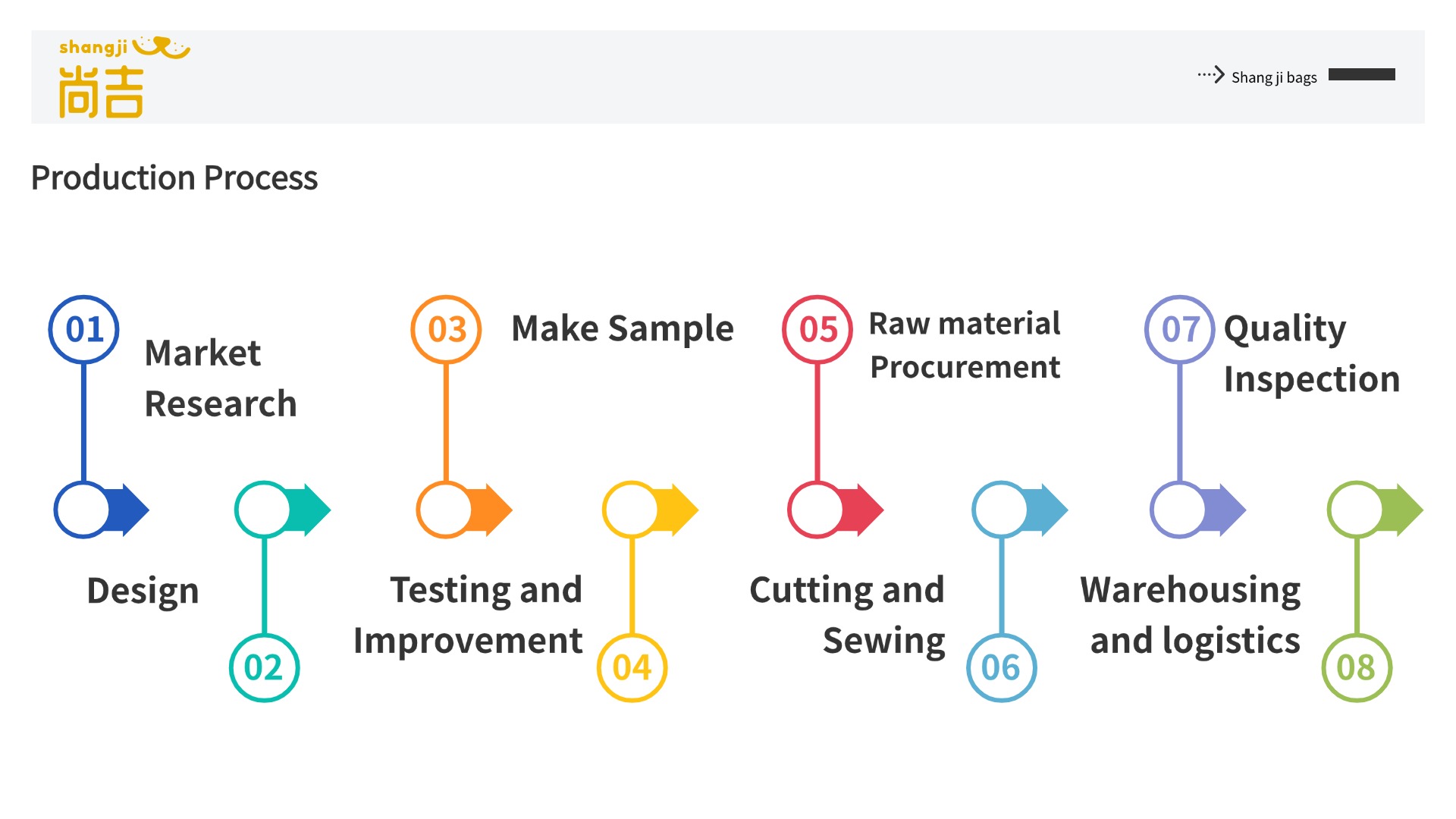Introduction to the Production Process of Shangji bags Factory

Our factory's production process requires multiple processes and strict quality control to ensure the quality and performance of the products. The following is the basic process of bags production:
1、 Design and Development
1. Market research
The design team will conduct in-depth research on market trends, consumer demands, functional requirements, and competitor products to provide direction and inspiration for the development of new products.
2. Conceptual design
Based on market research results, the designer began to conceptualize the design of bags in terms of style, color, pattern, size, and function. They will draw preliminary sketches to show the appearance and approximate structure of the bags.
3. Sample production
After completing the conceptual design, the prototype engineer will create a physical sample based on the design drawings. Samples typically use materials similar to the final product, but may require further refinement in terms of details and craftsmanship.
4. Testing and improvement
The prepared sample will undergo a series of tests, including durability testing, load testing, waterproof testing, etc., to verify the performance and quality of the luggage. At the same time, the design team will improve and optimize the samples based on test results and customer feedback until the desired results are achieved.
2、 Raw material procurement
1. Fabric selection
There are various types of fabrics for bags, such as nylon, polyester fiber, leather, canvas, etc. Purchasing personnel will select suitable fabric suppliers and purchase corresponding fabrics based on product design requirements and cost budgets.
2. Procurement of accessories
In addition to the fabric, bags also require various accessories such as zippers, zippers, buckles, shoulder straps, linings, etc. The quality and performance of these accessories directly affect the overall quality of the luggage, so procurement personnel need to strictly screen suppliers to ensure that the quality of the accessories meets the standards.
3、 Cutting and Sewing
1. Cropping
Cut the purchased fabric and lining according to the design template. During the cutting process, it is necessary to ensure accurate dimensions and neat edges to improve sewing efficiency and product quality.
2. Sewing
The cut fabric and lining will be sent to the sewing workshop for skilled lathe workers to use professional sewing machines for sewing. During the sewing process, attention should be paid to the uniformity and firmness of the stitching, as well as the flatness and alignment of the joints.
4、 Post processing
1. Ironing
After sewing, the bags needs to be ironed to remove wrinkles, make the surface of the luggage smoother, and also help with shaping.
2. Packaging
After ironing, the bags will be cleaned and organized, and then placed in the corresponding packaging bag or box. The selection of packaging materials needs to consider factors such as product protection, aesthetics, and environmental protection.
5、 Quality inspection
1. Process inspection
At every stage of the production process, quality inspectors are required to conduct spot checks to promptly identify and resolve quality issues that arise during production, ensuring that the product quality of each process meets the requirements.
2. Finished product inspection
All boxes and bags need to undergo a comprehensive finished product inspection before packaging, including appearance, size, function, durability, sewing quality, etc. Only products that pass the inspection can enter the market for sale.
6、 Warehousing and logistics
1. Warehousing
Qualified bags will be stored in the warehouse and classified according to style, color, size, etc. for easy management and shipment.
2. Logistics
According to customer orders, warehouse management personnel will arrange shipment and choose the appropriate logistics method to send the bags to the customer's hands.



